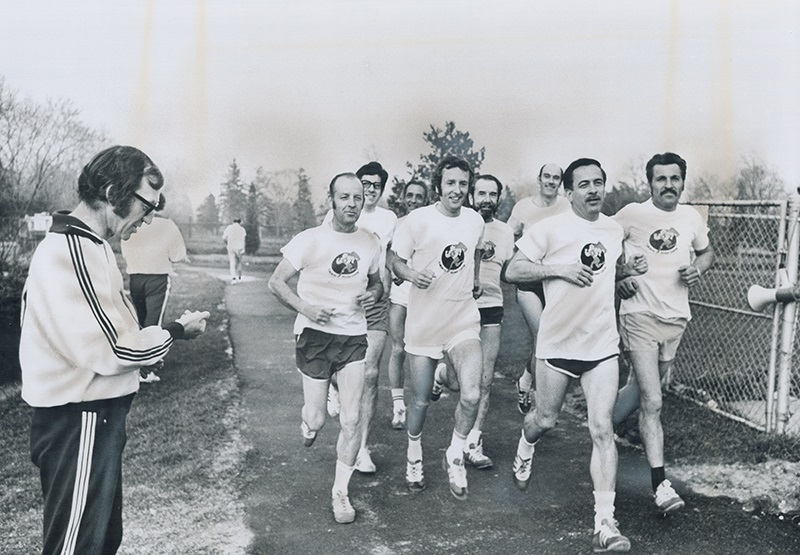The Faculty of Kinesiology and Physical Education is remembering a leader in cardiac rehabilitation, Professor Emeritus Terry Kavanagh, who died on September 10 at the age of 91. Dr. Kavanagh held joint positions at the Faculty of Medicine and the School of Physical and Health Education, later renamed to KPE.
“I was very sorry to hear of the recent passing of my good personal friend and academic collaborator,” said Roy Shephard, professor emeritus of applied physiology and director of the School of Physical and Health Education.
“I came to know Terry very soon after my arrival in Canada, in the mid 1960s. My first assignment in my country of adoption was to direct the newly established Fitness Research Unit at the University of Toronto, and one of my early tasks was to work with the (then) Ontario Heart Foundation to organize a 3-day International Conference of Physical Activity and Cardiovascular Health at the Inn on the Park.”
In addition to a focus on preventive cardiology, the conference examined the emerging idea that the recovery of patients who had sustained a heart attack would proceed more rapidly and more effectively if they engaged in progressively increasing levels of physical activity rather than following the accepted practice of resting in bed for several weeks.
“Both Terry and I were stimulated by this meeting to think in terms of developing an exercise program for cardiac patients at the Toronto Rehabilitation Institute (TRI). In the 1960s, such an idea was well accepted by physical educators, but many Canadian physicians were reluctant to depart from the tradition of prolonged bed rest. Not so Terry,” said Shephard.
Together they developed laboratory facilities where graduate students from the Fitness Research Unit could share in the ground-breaking work with Dr. Kavanagh, documenting the physiological effects of progressive exercise in cardiac patients at TRI.
KPE Professor Jack Goodman was an undergraduate student in Physical Health and Education when he volunteered at the TRI program, working as a track supervisor in the exercise testing lab.
“At that time, I was too scared to talk to Dr. Kavanagh. He seemed larger than life, was and remained an icon in cardiac rehabilitation. Years later, it was my good fortune to reconnect on a different level, this time as a young faculty member in 1989. It was very exciting - almost surreal, to actually sit around a table and talk research with ‘TK’,” said Goodman.
“Dr. Kavanagh was somewhat of an iconoclast within the conventional field of medicine. When many were still advocating restraint or conservative approaches to exercise in patients with heart disease, Kavanagh instead showed the world that cardiac patients, even transplant patients, could run the Boston Marathon.”
As medical director of the cardiac secondary prevention and rehabilitation program at TRI, Kavanagh trained more than 100 former cardiac patients to run marathons around the world. In 1973, six graduates of his running program entered the 26-mile Boston Marathon and all of them completed it.

Former heart attack patients and graduates of Dr. Kavanagh's long distance running program compete in the 1973 Boston marathon under his watchful eye (photo by Harold Barkley, Toronto Star, via Getty Images)
The last time Kavanagh ran with his group of graduates was in 1985. The group of 15 included Welshman Brian Price, the first heart transplant patient to finish a marathon race - only 15 months after surgery.
“Terry made major advances in our understanding of the initial physiological limitations imposed by heart disease, to devise appropriate methods for the safe prescription of increasing volumes of physical activity, and to bring the discipline of cardiac rehabilitation to the important position it now occupies in world-wide medical practice,” said Shephard.
“His death has deprived Toronto, Canada and the entire medical community of a tireless worker who achieved so much for the well-being of cardiac patients and the health of our population as a whole.”
His legacy continues through the Heart Health Lab in the Goldring Centre for High Performance Sport, named after Dr. Kavanagh. Led by Professor Goodman, the laboratory’s focus is on advancing research in the area of heart function and exercise.
“Dr. Kavanagh was one of the first to demonstrate the importance and feasibility of exercise rehabilitation in higher risk patients with heart failure. His body of published work and the novel approach of structuring the rehabilitation program remains a standard against which cardiac rehabilitation programs are measured,” said Goodman.
